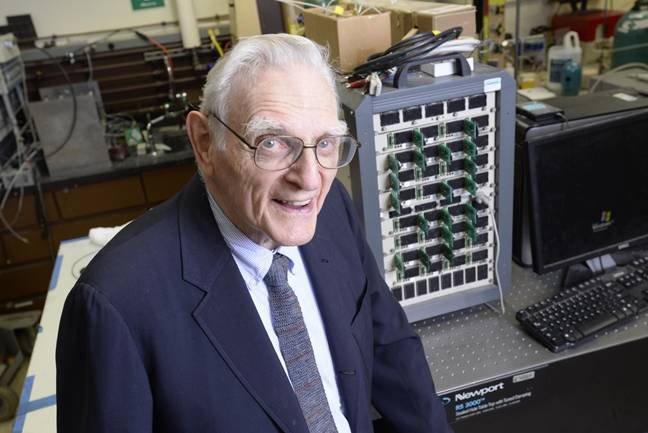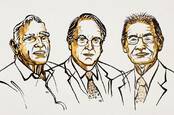After Decades Contributing To Science, John Goodenough Powers Down

Obit American materials scientist and co-inventor of the lithium-ion battery John B Goodenough died yesterday, according to reports. He was 100.
The Nobel laureate and professor of mechanical, material science, and electrical engineering at the University of Texas, Austin, enjoyed a long and prestigious career in chemistry but is best known for his significant contribution to the development of lithium-ion batteries which shaped the landscape of mobile telecommunications and computing.
UT Austin president Jay Hartzell said: "John's legacy as a brilliant scientist is immeasurable — his discoveries improved the lives of billions of people around the world.
"He was a leader at the cutting edge of scientific research throughout the many decades of his career, and he never ceased searching for innovative energy-storage solutions."

That lithium-ion battery in your phone or car? It has just won three chemists the Nobel Prize
READ MOREBorn in 1922, Goodenough became the oldest Nobel prize winner in 2019 when he shared the award with Stanley Whittingham of Binghamton University, State University of New York, and Akira Yoshino of the Asahi Kasei Corporation and Meijo University, Japan.
The lightweight, rechargeable and powerful batteries have transformed consumer electronics and mobile computing, ushering in an era of omnipresent smartphones, laptops and tablets. The Nobel committee also noted their contribution to making possible a fossil fuel-free society through their use in cars and their ability to store renewable energy, such as solar and wind power.
Goodenough was born in Jena, Germany, to American parents. He served in the Second World War as a meteorologist and in 1944 attained a degree in mathematics at Yale University.
- Legendary Li-ion battery boffin John Goodenough to develop gel power packs with South Korea's SK Innovation
- If it's Goodenough for me, it's Goodenough for you: Canuck utility biz goes all in on solid-state glass battery boffinry
- That lithium-ion battery in your phone or car? It has just won three chemists the Nobel Prize
- Li-ion king Goodenough creates battery he says really is... good enough
Following a master's and doctorate in physics at the University of Chicago, Goodenough became a research scientist and team leader at MIT's Lincoln Laboratory. In his 24 years there, he was part of the team that developed random access magnetic memory, first used in a computer in 1953. The UK's Manchester University used cathode ray-based RAM in a computer in 1948.
In the 1970s and 1980s, Goodenough served a tenure at Oxford University. There he helped develop the commercial potential for lithium-ion rechargeable batteries. Expanding work from Stanley Whittingham, he proposed a new cathode material, lithium cobalt oxide (LixCoO2) to improve high energy density, a move that doubled the capacity of lithium-ion batteries. Akira Yoshino improved the construction at Sony.
Li-ion king Goodenough creates battery he says really is... good enough
READ MOREAfter Goodenough was awarded science's greatest gong, Austin University president Gregory Fenves noted that the researcher's work had affected billions of people. But Googenough was also "an outstanding teacher, mentor and researcher," he said.
"Live to 97 years old, and you can do anything," Goodenough said at the time.
He was married to Irene Wiseman, who he met at the University of Chicago. She died in 2016. ®
From Chip War To Cloud War: The Next Frontier In Global Tech Competition
The global chip war, characterized by intense competition among nations and corporations for supremacy in semiconductor ... Read more
The High Stakes Of Tech Regulation: Security Risks And Market Dynamics
The influence of tech giants in the global economy continues to grow, raising crucial questions about how to balance sec... Read more
The Tyranny Of Instagram Interiors: Why It's Time To Break Free From Algorithm-Driven Aesthetics
Instagram has become a dominant force in shaping interior design trends, offering a seemingly endless stream of inspirat... Read more
The Data Crunch In AI: Strategies For Sustainability
Exploring solutions to the imminent exhaustion of internet data for AI training.As the artificial intelligence (AI) indu... Read more
Google Abandons Four-Year Effort To Remove Cookies From Chrome Browser
After four years of dedicated effort, Google has decided to abandon its plan to remove third-party cookies from its Chro... Read more
LinkedIn Embraces AI And Gamification To Drive User Engagement And Revenue
In an effort to tackle slowing revenue growth and enhance user engagement, LinkedIn is turning to artificial intelligenc... Read more

